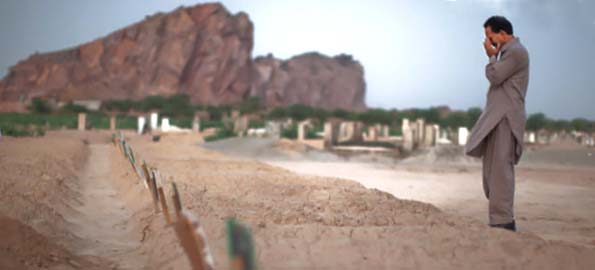My New Year’s resolution is to not die for my faith. I’d hoped that 2012 would bring a revolution among Muslims and Muslim-majority nations to free oppressed minds.
Yet I find myself still waiting to not die. That’s the “curse” of being an Ahmadi Muslim in too much of the Muslim world.
Ahmadi Muslims believe Mirza Ghulam Ahmad (1835-1908) is the long awaited messiah and Mahdi the Prophet Mohammed foretold, sent to unite mankind and establish peace. But this isn’t an evangelical piece, so please, keep reading.
Instead of peace, 2012 brought increased persecution in which vigilante murder, unjust arrest and outright discrimination against Ahmadi Muslims continued. A new type of persecution also increased, from which even death is not an escape.
On December 3, armed extremists destroyed 120 graves belonging to Ahmadi Muslims at a cemetery in Lahore, Pakistan. When I condemned the attack on Twitter, the response from some was just as ignorant. “You’re an infidel! Stop calling yourself a Muslim!” “You’re causing Fitna (or chaos) stop with these infidel beliefs!” Across Pakistan, Europe, Indonesia—and yes, even here in America—this is reality for Ahmadi Muslims.
I get it.
Some Muslims aren’t thrilled that Ahmadi Muslims believe the messiah has come because they expect Jesus, son of Mary, to literally descend from heaven. Ahmadi Muslims believe the Quran is clear that Jesus died a natural death many years after surviving the crucifixion.
But this isn’t about persuading anyone to believe us. Instead, it is about confronting Fitna’s actual source and recognizing the biggest poison for Muslims worldwide: religious bigotry.
Sometimes that bigotry is peripheral. The other day I tweeted a quote from Minnesota Rep. Keith Ellison praising the head and Khalifa of the Ahmadiyya Muslim Community, Mirza Masroor Ahmad, “… under (your holiness’) leadership the Ahmadiyya Muslim Community has been a true blessing for us here in the United States.” Like clockwork I lost a dozen followers.
Sometimes that bigotry is disguised as a compliment. “You’d be such a good Muslim, if only you weren’t a Qadiani,” someone once told me in person. Qadiani is a pejorative for Ahmadi Muslims. The “compliment” reeks of patronization, is actually an insult, and ignores the shocking possibility that perhaps I am a “good Muslim”because I am an Ahmadi Muslim.
Sometimes that bigotry is direct. “You Qadiani mother–er! You will burn in hell for your beliefs! You godd- Jewish agent I’ll kill you!” No comment.
The above religious bigotry I can handle. When some of the above sometimes turns to death threats, I can only foolishly hope my wife doesn’t find out. (She has this funny thing where she doesn’t want her husband brutally murdered. I know I know, women!)
But sometimes that bigotry is full-blown state-sanctioned persecution and violence. Like in certain Arab states where Ahmadi Muslims are incarcerated and deported for the crime of being an Ahmadi Muslim. Or like in Pakistan where simply claiming Mirza Ghulam Ahmad is the messiah is a criminal offense warranting capital punishment for the use of derogatory remarks in respect to the Prophet.
No exaggeration—as we lawyers like to say—that’s the black letter of the law. Fortunately, no Ahmadi Muslim in Pakistan has been executed for this crime, yet. But is it anything less than an execution when the Taliban murders 86 Ahmadi Muslims in broad daylight and the police, who admitted to knowing of the attack beforehand, look on from afar?
Look, I’m not looking for special treatment. Nor do I want sympathy. But I do want one thing for the sake of humanity: That Muslims condemn all forms of religious bigotry—peripheral, patronizing, direct and violent. While this simple request is what’s right, some turn a deaf ear, despite Prophet Mohammed’s pluralistic example.
Ahmadi Muslim Islamic Sect has appealing message for U.S. politicians but has global enemies
Mohammed championed religious equality in the Charter of Medina he signed with Jews. He assured protection of religious freedom in his letter to Christian monks at St. Catherine’s Monastery. He also afforded all Arabs carte blanche forgiveness when peacefully retaking Mecca—on the single condition that religious freedom reign free. Even Prophet Mohammed’s rules of war were specifically designed to protect, not persecute, religious freedom.
Every Ahmadi Muslim, Shia Muslim, Christian, Jew, Hindu, Buddhist, Baha’i, Sikh, atheist, agnostic, pagan—and the list goes on—has that fundamental human right to religious freedom. Establishing that right creates the peace and mutual respect we all ostensibly want.
I say ostensibly, because when it comes to religious freedom in too much of the Muslim world, I’m still waiting to not die. I’ll continue to wait, alongside millions, until Muslims recognize religious bigotry for what it is—a cancer—and expel it from their midst. Yet, my in-box will reflect that this simple plea has, for some, fallen on deaf ears.
Well, I guess I better not slack on my New Year’s resolution.
From: CNN Belief Blog

